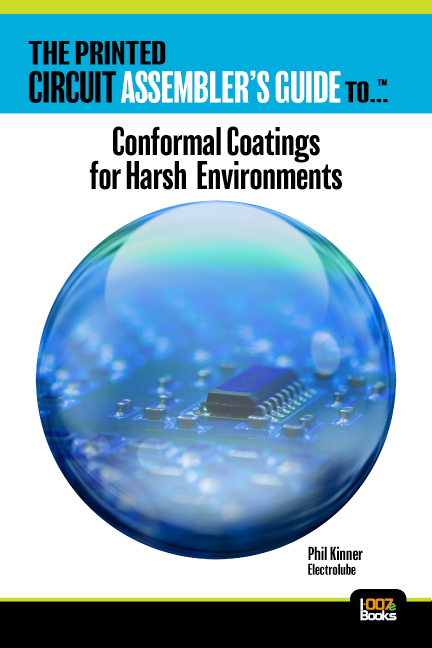ISBN: 978-0-9982885-5-0
 Phil Kinner, Electrolube's global business and technical director (International Conformal Coatings Division), has more than 16 years' experience within the conformal coating industry covering both materials and equipment. Using his wealth of knowledge, Phil specialises in new product development and has master's degrees in both chemistry and business administration. Phil is also an active member of the IPC Conformal Coating Task Group, a regular speaker at IPC and SMTA events, and a member of the technical committee of the UK SMART group.
Phil Kinner, Electrolube's global business and technical director (International Conformal Coatings Division), has more than 16 years' experience within the conformal coating industry covering both materials and equipment. Using his wealth of knowledge, Phil specialises in new product development and has master's degrees in both chemistry and business administration. Phil is also an active member of the IPC Conformal Coating Task Group, a regular speaker at IPC and SMTA events, and a member of the technical committee of the UK SMART group.
Electrolube is a global manufacturer of specialist chemical solutions for the electronics industry. With our expansive range of formulated chemical products, we supply leading manufacturers of electronic, industrial, and domestic devices for a variety of industries worldwide.
As a leading manufacturer, we strongly emphasize both research and collaboration, and are constantly developing new and environmentally friendly solutions for our customers. Our product groups include conformal coatings, thermal management solutions, encapsulation resins, contact lubricants, cleaning solutions, and maintenance and service aids thus offering the complete solution at all levels of production.
Electrolube products are integral to the manufacture and maintenance of electrical and electronic components and assemblies in many different sectors including LED, automotive, military, aerospace, marine, telecommunications, industrial electronics and more. All our product ranges are manufactured at our BS EN ISO 9001, 14001, BSI-AS9100, IATF 16949:2016 and OHASA 18001 accredited factories in the UK, China, and India.
 Debbie Obitz
Debbie Obitz
 Douglas Pauls
Douglas Pauls
 Helmut Schweigart
Helmut Schweigart
Chapter Summaries
-
Chapter 1
Chapter 1: Types of Material—How Many Choices?
Chapter 1 classifies and describes the main types of conformal coating chemistries. The chapter also outlines strengths and weaknesses of each type, and discusses one new class of material that has received much attention. -
Chapter 2
Chapter 2: Protection, Protection, Protection
Chapter 2 highlights four common concerns and reasons one might decide to use conformal coating. This chapter includes two case studies that demonstrate conformal coating issues and solutions. -
Chapter 3
Chapter 3: The True Value of Reliability Testing
Chapter 3 explores how to achieve excellent coverage at an adequate thickness, and the need for testing to ensure reliability in high-performance environments. -
Chapter 4
Chapter 4: Condensation Testing—Working with the NPL
Chapter 4 explains condensation testing, a new test method developed by the National Physical Laboratory in the UK. This approach aims to determine which conformal coating material will work best for a given harsh environment. -
Chapter 5
Chapter 5: Industry Standards and Best Practices
Chapter 5 focuses on standards, practices, and requirements that provide guidance for workmanship within the industry. Further, the chapter details a recent blind state-of-the-industry assessment of conformal coating thickness and coverage. -
Chapter 6
Chapter 6: Less is Most Definitely More
Chapter 6 discusses how more conformal coating layers do not necessarily provide better protection, and cautions users about using conformal coating ranges that are too thick. -
Chapter 7
Chapter 7: I Have Selected the Coating—How Do I Apply It?
Chapter 7 presents a variety of application methods used for conformal coatings. This chapter focuses on those used in the context of coating for harsh environments, and explores the benefits and drawbacks of each method.




